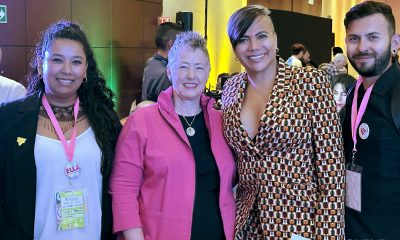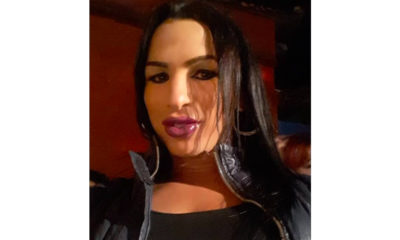News
Salir de las redes sociales a las calles
Activistas independientes en Cuba usan métodos innovadores
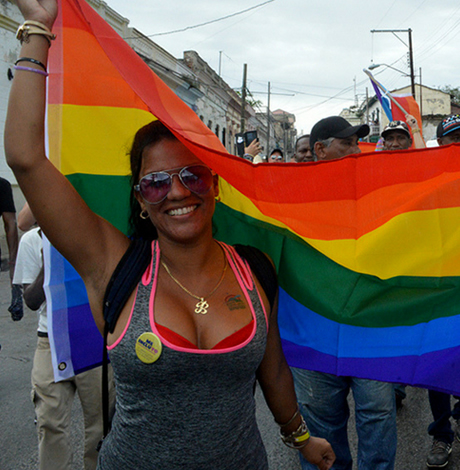
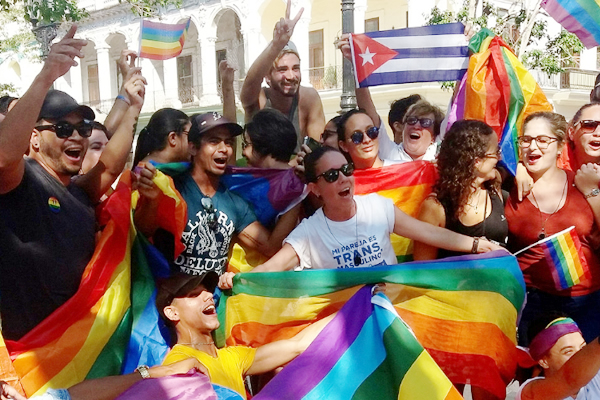
Un grupo de activistas por los derechos LGBTI+ en Prado y Malecón en La Habana el pasado 27 de octubre. (Foto cortesía de Jimmy Roque Martínez)
Nota del editor: Tremenda Nota es una revista electrónica independiente que documenta la comunidad LGBTI+ del país y otros grupos minoritarios. Tremenda Nota es una pareja de contenido del Washington Blade.
Esa nota salió originalmente en el sitio web de Tremenda Nota.
LA HABANA — Mientras las iglesias se oponen a la aprobación del matrimonio igualitario en Cuba y el Cenesex mantiene una postura pública discreta, los activistas LGBTI+ — menos organizados que las instituciones religiosas ― promueven campañas en diferentes soportes y medios.
A las tres de la tarde del 27 de octubre de 2018, en la intersección de Prado y Malecón, La Habana, debía celebrarse una besada — o Besuqueo, como le llamaron sus organizadoras — en apoyo al matrimonio igualitario. Unas horas antes habían confirmado su asistencia más de 600 personas y la invitación había sido compartida un centenar de veces en redes sociales. “Sacar los besos del clóset” era la divisa.
Durante el Besuqueo el Proyecto Abriendo Brechas de Colores (ABC) — LGTBI — un grupo que busca “generar espacios de diálogo entre los discursos religiosos y sociales en torno a los derechos de las mujeres y las personas LGBTIQ+” ― entregaría folletos sobre el fundamentalismo religioso, así como carteles y pegatinas alegóricos a la diversidad sexual y de género.
ABC también planeaba proyectar videos producidos en la campaña Todos los derechos para todas las familias. Los besos más creativos quedarían plasmados en una sesión de fotos. En esa zona del Prado se “izarían” banderas de la diversidad.
Sin embargo, un día antes de la cita ABC canceló públicamente el Besuqueo por no recibir el permiso estatal para tomar la calle.
Pese a la suspensión, a la hora y el día previstos hubo un flash mob (movilización relámpago) en Prado y Malecón. Acudieron las organizadoras del evento y otros activistas vinculados al Centro Nacional de Educación Sexual (Cenesex). Se besaron.
El Besuqueo no trascendió más: Asistieron unas 30 personas, en lugar de la multitud que podía haber acudido.
La cancelación del evento y la actitud reticente de sus promotoras generaron críticas de varios activistas en las redes sociales. El poeta Norge Espinosa resumió su decepción así: “El activismo de veras se hace con arrojo, con la disposición precisa a ir más allá de los límites permitidos, o no se hace”.
Paradójicamente, dos días antes de que ABC cancelara el Besuqueo, la Iglesia Metodista de Marianao reunió unos 3.500 feligreses en los alrededores del templo para mostrar su desacuerdo con el matrimonio igualitario, según informó la propia institución en su página de Facebook. Celebraron un culto multitudinario, sin permiso de nadie.
Iglesias versus activistas
Hasta ahora las iglesias cubanas han mantenido una postura firme en contra del matrimonio igualitario y “la ideología de género” en las páginas institucionales de sus redes sociales.
Pero su activismo también ha traspasado las fronteras del mundo virtual. Los feligreses han distribuido a lo largo del país carteles y pegatinas que defienden el “diseño original de la familia, como Dios la creó”. También se han manifestado en las calles aledañas a sus templos y, como si fuera poco, han “publicado” sus mensajes en el “paquete semanal”, la variante cubana a la internet.
Ahora quieren llegar más lejos. La reverenda Alida León, presidenta de la Liga Evangélica de Cuba, confirmó a Tremenda Nota que una veintena de denominaciones recogen firmas contra el artículo 68. “No tenemos nada en contra de los homosexuales, pero exigimos que se conserve el concepto de matrimonio como Dios lo creó”.
En efecto, el pasado 13 de noviembre más de una decena de denominaciones cristianas hicieron pública una carta enviada a la “Comisión Constitutiva del del Proyecto de Constitución, Comité Central del PCC”. Las 13 iglesias que suscriben el documento aseguran haber recogido casi 180.000 firmas contra la modificación del concepto de matrimonio en el proyecto de Carta Magna.
La comunidad cristiana podría votar No en el próximo referendo si se mantiene el artículo 68 en el Proyecto de Constitución. En su texto “El artículo 68: Evangélicos, católicos, el movimiento LGBTI y las cortinas de humo” el intelectual y activista Alberto Abreu Arcia asegura que León Báez, uno de los líderes de la iglesia evangélica en Cuba, declaró: “Si no se modifica el tema del matrimonio en el proyecto de Constitución todo votaremos en contra”.
De acuerdo con el Instituto Patmos en 2017 el 10 por ciento de la población cubana profesaba la fe evangélica, mientras que un 35 por ciento se consideraba nominalmente católico. Las denominaciones cristianas están organizadas y tienen presencia a lo largo del archipiélago cubano. Disponen de locales de reunión y de mecanismos de comunicación directa con el Estado. Por ende, el activismo independiente tiene menos ventaja en esta “contienda”.
Muchos defensores de los derechos LGBTI+ en Cuba han tenido que seguir el guión trazado por el Cenesex: Desfilan en mayo a paso de conga y luego regresan a las redes sociales, donde se acumulan denuncias, mensajes y campañas. A las calles no se puede llegar sin la anuencia del Gobierno.
“Las redes sociales y los entornos digitales han venido a suplir las carencias de legitimidad en otros espacios, pero no permiten dar respuesta a todos los desafíos”, explica a Tremenda Nota el joven activista Yadiel Cepero.
“En aras de transformar el estado actual de cosas creo, como muchos otros activistas, que se debe impulsar la agenda LGBTI+ a la par que se impulsan los derechos civiles y políticos. De manera que los colectivos puedan legalizarse, articularse, disponer de espacios de reunión y hacer uso de mecanismos de participación e incidencia política”, asegura Cepero.
Para el fundador de la plataforma de discusión Construyendo una agenda de la diversidad sexual en Cuba, el primer paso de los defensores de los derechos LGBTI+ sería arriesgarse a tomar el espacio público. “La iglesia puso sus carteles y no pasó nada. ¿A qué le tenemos miedo?”
Sin embargo, durante los debates constitucionales un sector del activismo cubano se ha mantenido a la zaga de las iglesias, confiado en el papel del Estado como garante de derechos.
“Tenemos una herencia fuerte de inactividad, de miedo. Muchas veces porque no nos han dejado caminar solos”, asegura la activista y abogada Lidia Romero. “Hemos llegado a un momento importante para impulsar derechos y justo ahora parece que no sabemos qué hacer, ni cómo organizarnos.”
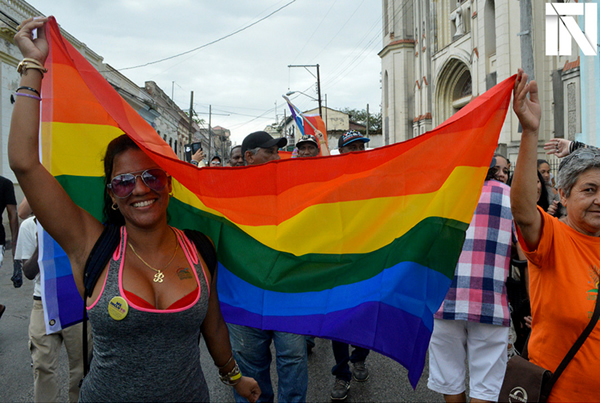
Solo el 17 de mayo ―Día mundial de la lucha contra la homofobia y la transfobia― el Gobierno, a través del Cenesex, autoriza que los activistas, personas LGBTI+ o simpatizantes de la causa de los derechos sexuales marchen. (Foto por Yariel Valdés González)
Algunos activistas creen inevitable la aprobación del artículo 68 y, por tanto, asumen que sería ocioso replicar a los grupos religiosos. El periodista Francisco Rodríguez Cruz aseguró en su blog Paquito el de Cuba que no debe temerse a que “la matriz de opinión conservadora de algunas iglesias pueda imponerse al resto de la sociedad”.
El bloguero explica que los resultados de la consulta popular no los definirá la cantidad de firmas que reúnan las iglesias ni el número de planteamientos en contra del artículo 68, “sino el análisis de la pertinencia o no de cada propuesta que surja del debate, por parte de la comisión redactora del proyecto constitucional y del Parlamento que aprobará el texto definitivo antes del referendo”.
La opinión de Rodríguez Cruz se apoya en las declaraciones del Secretario del Consejo de Estado, Homero Acosta Álvarez. El pasado 17 de octubre, durante la inauguración del Congreso Internacional Abogacía 2018, el jurista dijo: “El Derecho no puede permanecer esclavo perpetuo de rezagos sociales, aún cuando en un momento pueda entrar en colisión con parte del espectro social. En su misión transformadora le corresponde también impulsar el desarrollo”.
‘Vamos a convocar nuevas besadas’
En las últimas semanas varios activistas han puesto a circular en las redes sociales videos cortos donde personas LGBTI+ (o no) muestran su apoyo al artículo 68 del Proyecto de Constitución.
Las páginas 68Va, Acepto, Por el matrimonio igualitario en Cuba, Proyecto Abriendo Brechas de Colores – LGTBI, Construyendo una agenda de la diversidad sexual en Cuba e Iglesia de la Comunidad Metropolitana en Cuba (ICM) llevan adelante diferentes campañas en las redes sociales. También se suman varios cibernautas desde sus perfiles personales o sus blogs.
Sin embargo, las propuestas o campañas generadas en estas plataformas digitales no logran trascender el espacio virtual en un país cuya población mayoritaria permanece desconectada.
Unos meses atrás, el 11 de mayo, una veintena de intelectuales y activistas cubanos publicaron una detallada agenda por los derechos LGBTI+ en Cuba. El documento — primero de su tipo en el país — incluye 63 demandas específicas y se divide en dos grandes secciones: medidas legislativas y políticas, planes y estrategias. Todos sus firmantes son miembros de la sociedad civil.
Algunos de los suscriptores son activistas que buscan alternativas independientes del Estado o el Cenesex para encauzar sus demandas.
“(El Cenesex) es una institución que excluye a quienes no concuerdan con sus ideas políticas, tampoco socializa los avances de su labor, sino que nos pide confiar en que ʻestán trabajandoʼ, sin tener más información que esto. No nos trata como iguales, ni como parte”, agrega Lidia Romero.
Recientemente, la activista Sandra Álvarez Ramírez, otrora webmaster del Cenesex y miembro del consejo editorial de la revista Sexología y Sociedad, fue replicada por el perfil de Facebook de la institución. “Los ʻperiodistas de verdadʼ no recibimos instrucciones desde Berlín”, escribió Cenesex cuando la psicóloga cubana residente en Alemania preguntó sobre la cancelación del Besuqueo.
Para varios militantes el panorama actual empeora por la falta de articulación de un movimiento LGBTI+ en Cuba. “Si tú no tienes espacios de socialización, ni de accionar, ni una institución que te represente como un todo, y ni siquiera puedes asociarte legalmente, entonces no hay trabajo articulado, pero debemos vencer esos límites”, termina Romero.
Menos unidos, más rezagados que las iglesias, los activistas comienzan a salir discretamente de las redes, empiezan a saber que les corresponde emplazar al Estado, a las instituciones y a una parte de la sociedad negada a que todas las personas alcancen todos los derechos.
Jimmy Roque Martínez — uno de ellos — no cree que los simpatizantes con la causa de los derechos sexuales deban mantenerse esperando los resultados del referendo constitucional con discreción. “Además de las historias de vida y opiniones que comenzaron a circular en las redes sociales, y las páginas creadas también vamos a convocar nuevas besadas, solo que estas no van a cancelarse”, augura.
Politics
Survey finds support for Biden among LGBTQ adults persists despite misgivings
Data for Progress previewed the results exclusively with the Blade

A new survey by Data for Progress found LGBTQ adults overwhelmingly favor President Joe Biden and Democrats over his 2024 rival former President Donald Trump and Republicans, but responses to other questions may signal potential headwinds for Biden’s reelection campaign.
The organization shared the findings of its poll, which included 873 respondents from across the country including an oversample of transgender adults, exclusively with the Washington Blade on Thursday.
Despite the clear margin of support for the president, with only 22 percent of respondents reporting that they have a very favorable or somewhat favorable opinion of Trump, answers were more mixed when it came to assessments of Biden’s performance over the past four years and his party’s record of protecting queer and trans Americans.
Forty-five percent of respondents said the Biden-Harris administration has performed better than they expected, while 47 percent said the administration’s record has been worse than they anticipated. A greater margin of trans adults in the survey — 52 vs. 37 percent — said their expectations were not met.
Seventy precent of all LGBTQ respondents and 81 percent of those who identify as trans said the Democratic Party should be doing more for queer and trans folks, while just 24 percent of all survey participants and 17 percent of trans participants agreed the party is already doing enough.
With respect to the issues respondents care about the most when deciding between the candidates on their ballots, LGBTQ issues were second only to the economy, eclipsing other considerations like abortion and threats to democracy.
These answers may reflect heightened fear and anxiety among LGBTQ adults as a consequence of the dramatic uptick over the past few years in rhetorical, legislative, and violent bias-motivated attacks against the community, especially targeting queer and trans folks.
The survey found that while LGBTQ adults are highly motivated to vote in November, there are signs of ennui. For example, enthusiasm was substantially lower among those aged 18 to 24 and 25 to 39 compared with adults 40 and older. And a plurality of younger LGBTQ respondents said they believe that neither of the country’s two major political parties care about them.
European Union
Activists demand EU sanction Uganda over Anti-Homosexuality Act
Yoweri Museveni signed law on May 29, 2023
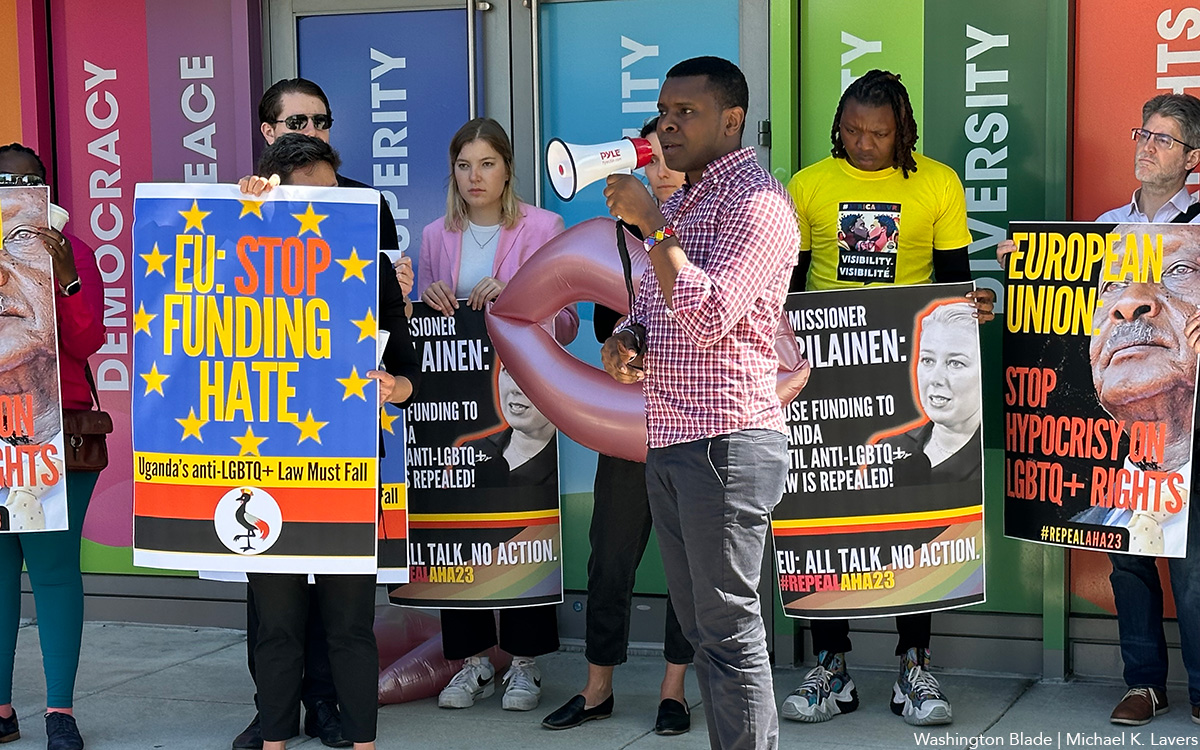
More than a dozen activists who protested in front of the European Union Delegation to the United States in D.C. on Thursday demanded the EU to sanction Uganda over the country’s Anti-Homosexuality Act.
Hillary Innocent Taylor Seguya, a Ugandan LGBTQ activist, and Global Black Gay Men Connect Executive Director Micheal Ighodaro are among those who spoke at the protest. Health GAP Executive Director Asia Russell also participated in the event that her organization organized along with GBGMC and Convening for Equality Uganda, a Ugandan LGBTQ rights group.
Ugandan President Yoweri Museveni last May signed the Anti-Homosexuality Act that, among other things, contains a death penalty provision for “aggravated homosexuality.”
The country’s Constitutional Court on April 3 refused to “nullify the Anti-Homosexuality Act in its totality.” A group of Ugandan LGBTQ activists have appealed the ruling.
A press release that Health GAP issued ahead of Thursday’s protest notes EU Commissioner for International Partnerships Jutta Urpilainen on March 6 announced more than €200 million ($212.87 million) for Uganda in support of “small business owners, young female entrepreneurs, agribusinesses as well as vital digital infrastructure projects in full Team Europe format with the European Investment Bank (EIB) and several member states.”
“These concrete initiatives will make a difference to aspiring entrepreneurs, Ugandan businesses and create jobs in multiple sectors,” said Urpilainen in a press release that announced the funds. “This is a perfect example of how Global Gateway can make a tangible difference for citizens and businesses and unlock the full potential of a partner country by working together.”
Convening for Equality Uganda on Tuesday in a letter they sent to Urpilainen asked the EU to review all funding to Uganda and “pause or reprogram any funds that go via government entities.” The protesters on Thursday also demanded European Commission President Ursula von der Leyen “to hold Ugandan President Museveni’s government accountable for this attack on human rights.”
Josep Borrell, the EU’s top diplomat, in a statement he released after Museveni signed the Anti-Homosexuality Act said the law “is contrary to international human rights law and to Uganda’s obligations under the African Charter on Human and People’s Rights, including commitments on dignity and nondiscrimination, and the prohibition of cruel, inhuman or degrading punishment.”
“The Ugandan government has an obligation to protect all of its citizens and uphold their basic rights,” said Borrell. “Failure to do so will undermine relationships with international partners.”
“The European Union will continue to engage with the Ugandan authorities and civil society to ensure that all individuals, regardless of their sexual orientation and gender identity, are treated equally, with dignity and respect,” he added.
Urpilainen last September in a letter to the European Parliament said the EU would not suspend aid to Uganda over the law.
Politics
Court records raise concerns about right-wing TikTok investor’s influence
Jeff Yass is a Pa. billionaire who has funded anti-LGBTQ causes

The role played by Pennsylvania billionaire Jeff Yass in the creation of TikTok might be far greater than was previously understood, according to new reporting that raises questions about the extent of the right-wing megadonor’s influence over matters at the intersection of social media, federal regulations, and electoral politics.
In 2012, Yass’s firm, Susquehanna International Group, spent $5 million for 15 percent of the short-form video hosting platform’s Chinese-owned parent, ByteDance. In the years since, as TikTok grew from a nascent startup to a tech giant with 1.5 billion active monthly users and an estimated $225 billion valuation, Yass and his firm pocketed tens of billions of dollars.
Beyond the size of Susquehanna’s ownership stake, little was known about its relationship with ByteDance until documents from a lawsuit filed against the firm by its former contractors were accidentally unsealed last month, leading to new reporting by the New York Times on Thursday that shows Susquehanna was hardly a passive investor.
In 2009 the firm used a proprietary, sophisticated search algorithm to build a home-buying site called 99Fang, tapping software engineer and entrepreneur Zhang Yiming to serve as its CEO. The company folded. And then, per the Times’s review of the court records, in 2012 Susquehanna picked Yiming to be the founder of its new startup ByteDance and repurposed the technology from 99Fang for use in the new venture.
Importantly, the documents do not provide insight into Yass’s personal involvement in the formation of ByteDance. And Susquehanna denies that the company’s search algorithm technologies were carried over from the real estate venture — which, if true, would presumably undermine the basis for the lawsuit brought by the firm’s former contractors who are seeking compensation for the tech used by ByteDance.
Questions about Yass’s influence come at a pivotal political moment
In recent weeks, federal lawmakers have moved forward with a proposal that would force ByteDance to divest TikTok or ban the platform’s use in the U.S. altogether, citing the potential threats to U.S. national security interests stemming from the company’s Chinese ownership.
The bill was passed on March 13 with wide bipartisan margins in the House but faced an uncertain future in the Senate. However, on Wednesday, House Speaker Mike Johnson (R-La.) announced plans to fold the proposal into a measure that includes foreign aid to Ukraine, Israel, and Taiwan, likely bolstering its chances of passage by both chambers.
Last month, shortly after meeting with Yass at his home in Mar-a-Lago, former President Donald Trump changed his longtime stance and came out against Congress’s effort to break up or ban TikTok. The timing led to speculation about whether the billionaire businessman was behind Trump’s change of heart, perhaps by contributing to the cash-strapped Republican presidential nominee’s electoral campaign or through other means.
Meanwhile, Yass has emerged as the largest donor of the 2024 election cycle. A coalition of public interest and government watchdog groups have called attention to the vast network of right-wing political causes and candidates supported by the billionaire, often via contributions funneled through dark money PACs that are designed to conceal or obscure the identities of their donors.
The Action Center on Race and the Economy, Make the Road, POWER Metro: Faith in Action, Free the Ballot, and Little Sis launched a website called All Eyes on Yass that features research into the various causes he supports, along with insight into the networks connecting the entities funded by his contributions.
Broadly, in Pennsylvania they fall into five categories: Advocacy against reproductive freedom and LGBTQ rights via the Pennsylvania Family Institute, lobbying on behalf of oil and gas industry interests by the Pennsylvania Manufacturers’ Association, anti-union groups supported by Commonwealth Partners, a privately owned registered investment advisory firm/independent broker-dealer, the Commonwealth Foundation for Public Policy Alternatives, which seeks to privatize public schools and defeat proposed increases to the minimum wage, and the Citizens Alliance of Pennsylvania, which advocates for lowering taxes on corporations and the rich.
Additionally, All Eyes on Yass reports that the billionaire has given massive contributions to Club for Growth and direct spending to support the electoral campaigns of right-wing Republicans including Florida Gov. Ron DeSantis; U.S. Sens. Ted Cruz (Texas), Rand Paul (Ky.), and Josh Hawley (MO); U.S. Rep. Lauren Boebert (Colo.), and former U.S. Rep. Madison Cawthorn (N.C.).
-

 Africa4 days ago
Africa4 days agoCongolese lawmaker introduces anti-homosexuality bill
-

 District of Columbia18 hours ago
District of Columbia18 hours agoReenactment of first gay rights picket at White House draws interest of tourists
-

 World4 days ago
World4 days agoOut in the World: LGBTQ news from Europe and Asia
-

 Arizona22 hours ago
Arizona22 hours agoAriz. governor vetoes anti-transgender, Ten Commandments bill



